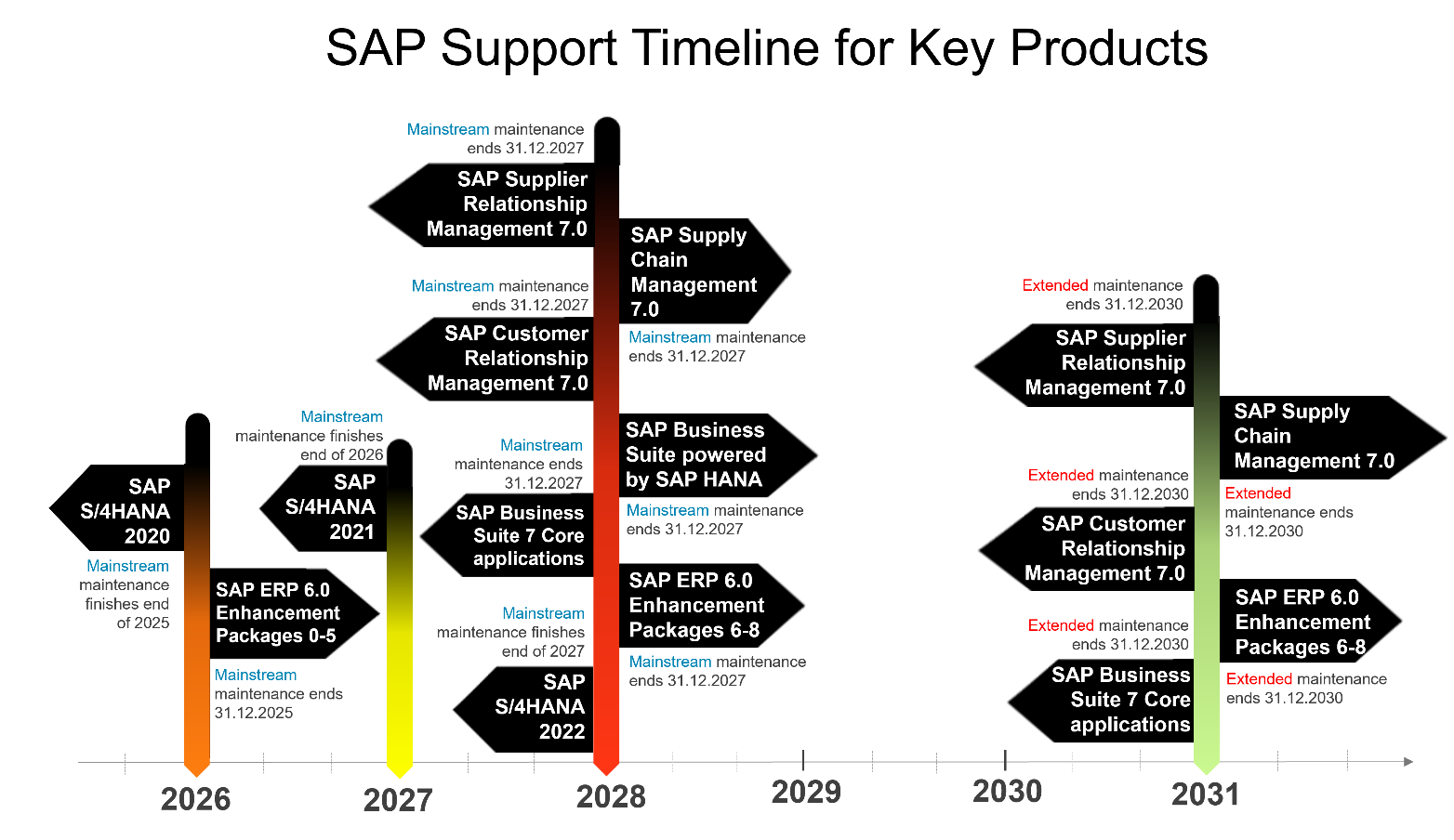As businesses increasingly rely on SAP to manage their operations, ensuring your SAP products remain within their support lifecycle is crucial. But what happens when your SAP products reach or exceed their support deadlines?
This article explores the implications of running out-of-support SAP products, available options, and steps to maintain your business continuity, security, and efficiency.
Understanding SAP Support
SAP provides support for many of its older products, but each has a defined lifecycle. Below is an overview of key SAP products approaching the end of Mainstream and Extended Maintenance.
If you are concerned about your SAP products nearing End of Support, we can help validate their status and explore migration options.

IMPORTANT UPDATE: SAP ERP, Private Edition, Transition Option
On February 4, 2025, SAP announced a new SAP ERP Cloud Subscription RISE journey focused on SAP ECC, providing dedicated support for customers requiring additional time to transition to SAP Cloud ERP.
The SAP ERP, Private Edition, Transition Option will offer security, legal, and software patches. It will be available for purchase in 2028 and active from 2031–2033 (two years post-extended maintenance).
Key Details:
- Scope: Supports SAP ECC, but not the full Business Suite 7 (specific products to be confirmed).
- Migration Deadline: Systems must move to SAP ERP, Private Edition by end of 2030.
- Database Requirement: SAP HANA is the only supported database, requiring adjustments (e.g., older Java versions no longer supported).
- Pricing: Higher fees apply for 2031–2033 compared to pre-2031 ERP cloud subscriptions, primarily targeting large enterprises with complex systems.
Further details will be announced closer to 2028.
What Happens When Your SAP Products Go Out of Support?
When your SAP products move out of support, several challenges arise:
End of Mainstream Maintenance
Once mainstream maintenance expires, SAP will no longer provide routine updates, patches or bug fixes. This can result in reduced system performance, increased downtime and compatibility issues.
1. Loss of New Features
Older systems will no longer receive new functionalities, improvements or innovations, which may impact competitiveness and limit efficiency.
2. Security Risks
Out-of-support products will be more susceptible to security breaches as they will no longer receive security patches, compromising data integrity and increasing vulnerability to cyber threats. Consumer knowledge of outdated systems can also reflect poorly upon brand perception and trust.
3. Compliance and Legal Issues
Running outdated software can introduce compliance risks, particularly in regulated industries, potentially leading to financial claims or legal implications.
4. Increased Costs Over Time
Extended maintenance comes at an additional cost (typically an extra 2%), and operational expenses may rise as unsupported systems become harder to maintain. Additionally, the cost of external support may increase.
Steps to Take if Your SAP Product Is Going Out of Support
To mitigate risks associated with unsupported SAP products, consider the following:
1. Review the SAP End of Support Timeline
- Ensure you are aware of the mainstream and extended maintenance deadlines to plan accordingly.
2. Assess the Impact on Your Business
- Evaluate potential security, compliance, and operational risks associated with unsupported software.
3. Evaluate Your Options
- Upgrade to SAP S/4HANA: The next-generation ERP system offers enhanced capabilities, scalability, and technological innovations beyond legacy solutions.
- Purchase Extended Maintenance: If an immediate migration is not feasible, extended maintenance provides continued support at an additional fee. Although yet to be confirmed, there is a possibility that SAP may also allow some customers to continue with their existing ECC (ONLY) environment post the 2027 deadline if they agree to sign a RISE with SAP deal (SAP ERP Transition Option).
- Consider Third-Party Support: Some vendors offer support for legacy SAP products, though this may come with limited functionality and increased audit risks. Ensure compliance to avoid financial repercussions.
4. Develop a Migration Plan
Planning ahead ensures a seamless transition. Our experts can guide you through S/4HANA transition services, cost modelling and deployment options to align with your business needs by:
- Assessing your Effective License Position (ELP) to determine current entitlements and compliance status.
- Exploring roadmap options to identify the most cost-effective and strategic migration path.
- Providing expert insights at each stage, from initial assessment to implementation and contract negotiations.
- Benchmarking your proposal to ensure the best commercial terms.
How we can help
Beyond S/4HANA Transformation Support we offer:
| ✓ | Audit Defense |
| ✓ | License Compliance & Optimization |
| ✓ | Indirect Use Management |
| ✓ | Security and User Management |
| ✓ | Contract Negotiation Support |
| ✓ | Managed Services |
Conclusion
Transitioning to a supported SAP solution is vital for security, compliance and operational efficiency. If your SAP products are approaching End of Support, now is the time to evaluate your options, whether that is:
- Migrating to the cloud
- Purchasing extended maintenance
- Considering third-party support services.
Taking a proactive approach ensures your business remains competitive, secure, and future-proofed. If you require guidance on SAP migration planning, compliance or contract negotiations, contact us today for expert assistance.
 |
Ed Thompson
Ed is an Associate Consultant at JNC UK, specializing in SAP solutions and digital transformation. With a first-class BSc in Business Management (Business Analytics) from Swansea University and experience in marketing and negotiation, he combines business acumen with analytical expertise. Ed is passionate about optimizing workflows, driving efficiency, and delivering SAP solutions. |
JNC offer a free 30-minute call with one of our expert consultants.
If you have any SAP licensing related questions, then get in touch.
Industry trusted SAP consultants
Start with an initial consultation to help you clearly understand the costs and benefits of fully leveraging SAP.



